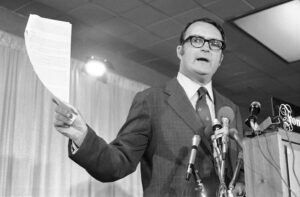They buried a Republican champion the other day, a man whose obituary contains a direct reference to his political heroism during a dark, scandalous time in U.S. history.
William Ruckelshaus died at age 87 at his Seattle home.
This man was an amazing, principled public servant who stood tall during the Watergate scandal. He was the nation’s deputy attorney general who, when his boss — AG Elliot Richardson quit while refusing to obey a presidential order — also exhibited supreme courage in following Richardson’s lead.
President Nixon was being swallowed up by the Watergate scandal. In 1973, Congress confirmed Archibald Cox as a special prosecutor to examine the evidence about whether the cover-up extended into the White House. Nixon pledged that Cox would be fully independent, that he could be fired only for malfeasance.
Cox began to get close to Nixon, who then ordered the AG to fire him; Richardson refused. Then the deputy AG got the order; Ruckelshaus quit. It fell, then, to Solicitor General Robert Bork to do what the president demanded.
The Saturday Night Massacre, as the resignations have come to be known, has become etched indelibly into American political lore. William Ruckelshaus stands as a giant man of principle among the key players in that drama.
It is his courage under political fire that is so terribly missing these days, particularly among those who comprise what is left of the Republican Party.
Ruckelshaus, moreover, was the founding director of the Environmental Protection Agency, which the Nixon administration created in 1970. Ruckelshaus was wedded to the idea of protecting our planet. That, too, remains high on his legacy of public service accomplishment.
If only this good man’s political descendants could rip a page from his Book of High Principle and adhere to the courage that William Ruckelshaus demonstrated in a time of political peril.
